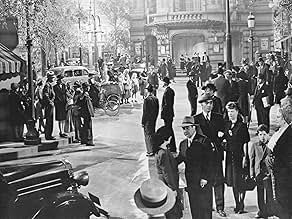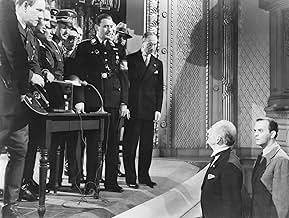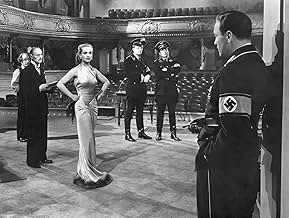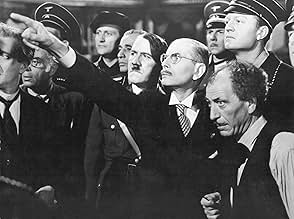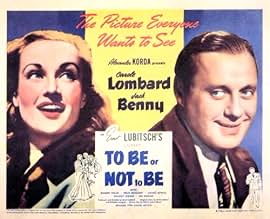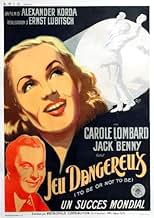During the German occupation of Poland, an acting troupe becomes embroiled in a Polish soldier's efforts to track down a German spy.During the German occupation of Poland, an acting troupe becomes embroiled in a Polish soldier's efforts to track down a German spy.During the German occupation of Poland, an acting troupe becomes embroiled in a Polish soldier's efforts to track down a German spy.
- Director
- Writers
- Stars
- Nominated for 1 Oscar
- 5 wins & 2 nominations total
- Polish RAF Pilot
- (uncredited)
- German Soldier
- (uncredited)
- Director
- Writers
- All cast & crew
- Production, box office & more at IMDbPro
Summary
Featured reviews
Despite having heard it mentioned (and avoided the remake) I had still never seen this film until earlier today. I wasn't sure what to expect as I knew that it had been made during the war and that it's humour might not seem as mocking or sharp today. However I was surprised how funny it actually was while it also dealt with the Nazi issue at the same time. The mocking tone of the film is balanced nicely by a real vein of wit with sharp word play all around. The plot is kept ticking over by this humour until Tura is able to drive the film by his many performances!
The Nazi's are mocked without taking away from the horrors of what they were. The cast are what really makes the film work for me though. Although he takes second billing, I can't help but feel that Benny is the star of the film as he has all the best characters and the lion's share of the lines. Lombard does very well indeed and shows a real ability for quick witty lines the fact that she died in a plane crash leaving this her last movie should be considered a great loss. The whole support cast, whether Polish actor or German commander, all play very well managing to bring both wit and pathos to the film.
Overall a film that is not as uncomfortable to watch as I suspected it might have been, in fact one that is downright hilarious at times and has all the sharpness and wit that I want in a comedy. When Jack Benny says `so they call me Concentration Camp Ehrhardt' for the 5th time, I defy you not to be rolling!
A cracking comic-caper, it follows a troupe of Polish actors who find themselves performing the roles of their lives- not on stage, but in Nazi-occupied Warsaw. When a young pilot is caught up in a spy plot, the troupe leaps into action, donning disguises, bluffing Gestapo officers and improvising as if their lives (and country) depend on it. At the centre is Benny's Joseph Tura, the pompous Hamlet-in-residence, and Lombard, as his wife Maria, luminous and quick-witted in what was sadly her final screen role.
The film effortlessly juggles tones. One moment it's pure farce- theatrical egos, slippery identities and a Hamlet with more flair than sense- and the next, it glances at real peril with a surprisingly steady gaze. Beneath the laughs, there's a pointed satire about authoritarianism, vanity and the roles people play to survive. The dialogue crackles with razor-sharp wit, every line balanced like a dagger on the edge of a laugh. Whether it's Benny's oblivious grandiosity or Lombard's wry deflections, Lubitsch keeps the script dancing- light on its feet, but never light on substance.
That Lubitsch made this film at the height of the Second World War is nothing short of astonishing. While Hollywood largely played it safe, he aimed straight for the absurd heart of fascism, daring to laugh. But this isn't mockery for its own sake- Lubitsch understood that ridicule, when wielded with precision, can be a subversive weapon. His satire is never cruel, but it is fearless: mocking vanity, the ridiculousness of the Nazi ideology, exposing cowardice; reminding us that even in the darkest times, a well-delivered line- or a perfectly timed pause- can carry a kind of truth that outlasts bombs and bluster.
Visually, the film is no slouch either. The production design conjures a grand theatrical world, full of velvet curtains, dressing rooms and shadowy corridors. Rudolph Maté's cinematography adds a crisp elegance, framing scenes with the same precision Lubitsch brings to the dialogue. It's handsome without being showy, stylish without upstaging the script; perfectly suited to the unfolding farce.
The cast is uniformly excellent, but it's Benny and Lombard who give the film its centre of gravity- or, rather, its comic orbit. Benny, one of the all-time comedic greats, leans gleefully into Joseph Tura's preening vanity, delivering a performance that's both absurd and oddly endearing. He plays a man desperate to be taken seriously, even as the world refuses to play along- a joke that never stops landing.
Lombard, by contrast, is all grace and mischief. Her Maria is a master of timing, charm and quiet control. She brings a knowing sparkle to every scene she's in. Sadly, Lombard would die before the film finished post-production- in this way it acts as a sterling swansong for a cinematic legend. Around them, the supporting players- from Sig Ruman's delightfully blustering colonel to Robert Stack's earnest pilot- flesh out a world where everyone, it seems, is playing to the gallery, even when the stakes are deadly.
Ernst Lubitsch's 'To Be or Not to Be' is a marvel- a film daring to be funny when all signs point to despair. It's sharp, silly and strangely stirring, a comedy that looks evil in the face and responds with a raised eyebrow and a perfectly arched punchline. In a world too often content to play it safe, Lubitsch reminds us that the boldest laughs are the ones that speak the hardest truths. Strongly acted and beautifully shot, 'To Be or Not to Be' ultimately proves that in the face of tyranny, the best answer is always to be- to laugh, to fight and to defy.
This Hitler, however, turns out to be the actor Bronski (Tom Dugan), a bit-player impersonating the Fuhrer in a play being put on by a Polish theatrical group. Is Hitler "by any chance interested in Mr. Maslowski's delicatessen?" teases the narrator in the opening segment. "That's impossible—he's a vegetarian!" Responding to all the "Heil Hitler" salutes, Bronski asserts "Heil myself" as he walks through an open door. Bronski is playing a secondary role to the famous Polish actor Josef Tura, played by Jack Benny, then a radio star whose trademark straight face and deadpan humor marks the film.
Tura's wife Maria, also a popular Polish actress, is played by Carole Lombard who was to meet a shocking death in a plane crash in January, 1942 shortly after the film was completed. In the film, Maria is two-timing her actor husband by romancing a young flyer Lt. Sobinski (Robert Stack) who falls "head over heels" for the actress. The running gag in the film is that whenever Josef is playing Hamlet and delivers the line, "to be or not to be," it is a signal for Sobinski to get up from his seat in the theater and go backstage to meet Maria in her dressing room. It appears that Tura is more upset about his speech being interrupted than what happens behind the curtain.
The sudden Nazi invasion, however, puts all romantic trysts on the back burner and the mood shifts to solemn. The plot now becomes more involved with espionage and patriotism than acting when Sobinski, now a pilot for the Royal Air Force, discovers that respected Polish professor Siletski (Stanley Ridges) is a double-agent working for the Nazis. When the Lieutenant returns to Warsaw to eliminate the traitorous professor, Maria and Josef team up to help by launching an elaborate charade to trick the unsuspecting Nazis. While the film takes its name from the famous line in Hamlet, Shylock's monologue from the Merchant of Venice, spoken in front of Nazi swastikas, is recited by Jewish actor Felix Bressart, "Have we not eyes? Have we not hands, organs, senses, dimensions, attachments, passions?" he asks the Nazis, "If you poison us, do we not die?"
It is a noteworthy plea for tolerance in the days of rabid anti-Semitism even though the line "Hath not a Jew eyes?" is not spoken. According to Thomas Doherty writing in Tablet magazine, "the word "Jew" was seldom heard on the Hollywood screen, even in war-minded scenarios where the topic of anti-Semitism was front and center." He also quotes film historian Lester D. Friedman saying that "The studio bosses were always—even at this point—afraid of thrusting Jews into the spotlight." Whatever the reason, To Be or Not to Be is marked with the genius of one man, the great Jewish director Ernst Lubitsch who said, "What I have satirized in this picture are the Nazis and their ridiculous ideology," and that the tone and temper of the film "cannot leave any doubt in the spectator's mind what my point of view and attitude are toward these acts of horror."
While the film is a broad and biting satire, from the beginning of production in November 1941 to its completion on December 24th, however, events made sure that To Be or Not to Be, as well as Charles Chaplin's The Great Dictator, was no longer a laughing matter.
Lubitsch was, by this time, coming to the end of an exquisite career that defined the nature of sophistication in 'light' cinema. 'To Be or Not To Be' skips lightly over all of the minefield of a subject like this and it is difficult or impossible to think of any other filmmaker who might have managed it (if you look at Mel Brooks' limp remake, you can see why).
In 1996, I presented a massive season of 'the greatest' films in Belfast for the centenary of cinema - 250 titles in 9 months. Of all of them, this was the film which got the greatest ovation - about 5 minutes with a nearly full house standing and applauding! They may have applauded for many reasons, but here are certainly some of them...
The very complicated narrative is presented virtually flawlessly and the comedy is never allowed to hold up the narrative. The principle actors - Carole Lombard (breathtakingly beautiful) and Jack Benny in particular, but many of the supporting cast as well - throw themselves into the affair with a gusto that is completely infectious. Apart from the satirical aspect of the story and the way in which Hitler and the Nazis are mercilessly ridiculed for their authoritarianism and the fear which is their only motivator, the film pokes gentle fun at the vanity of actors in a warm and happy manner. Finally, and most important, is the notion of farce. Farce rarely works in the cinema, but here it does, and in the grand manner - just look at how many times the situation regarding Professor Siletsky changes profoundly during the film - it is dizzying - yet the characters manage to come up with (often self-defeating or inappropriate) schemes on every occasion.
This is a wonderful work that, I have no hesitation in saying, is absolutely vital for anyone who wants to really understand the glory of the cinema. But to answer Dilys Powell's question... yes, the joke is deliriously funny.
Did you know
- TriviaWhen Jack Benny's father went to see this movie, he was outraged at the sight of his son in a Nazi uniform in the first scene and even stormed out of the theater. Jack convinced his father that it was satire, and he agreed to sit through all of it. His father ended up loving the film so much he saw it forty-six times.
- GoofsAlthough having Maria Tura give the cue line "To be or not to be" to the men in the audience she wishes to meet in her dressing room is a very funny premise of the film, it actually would be highly impractical for Maria to think she would have time to meet backstage. Hamlet's "To be or not to be" soliloquy is only about 3-4 minutes long and Ophelia has the very next line in the play (in fact Hamlet announces her entrance at the end of his soliloquy), which would barely give Maria any time to meet men in her dressing room.
- Quotes
Joseph Tura: [disguised as Professor Siletsky - speaking about Maria Tura] Her husband is that great, great Polish actor, Josef Tura. You've probably heard of him.
Colonel Ehrhardt: Oh, yes. As a matter of fact I saw him on the stage when I was in Warsaw once before the war.
Joseph Tura: Really?
Colonel Ehrhardt: What he did to Shakespeare we are now doing to Poland.
- Alternate versionsIn Poland, a brief introduction was edited in. Polish actor Kazimierz Rudzki assured the audience that the movie was done with best intentions by their "American friends". At the time the movie screened in Poland, many people still lived in trauma from the events of World War II; few could find comedy in the German invasion of Poland, instead finding the movie in poor taste, offensive, or hard to swallow.
- ConnectionsFeatured in Showbiz Goes to War (1982)
- SoundtracksPolonaise in A major, Op. 40, No. 1, 'Military'
(1838) (uncredited)
Written by Frédéric Chopin
Orchestral arrangement by Aleksandr Glazunov
Heard during the opening and closing credits
- How long is To Be or Not to Be?Powered by Alexa
Details
Box office
- Gross US & Canada
- $3,270,000
- Gross worldwide
- $4,578,000
- Runtime1 hour 39 minutes
- Color
- Aspect ratio
- 1.37 : 1

